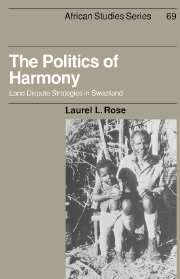Book contents
- Frontmatter
- Contents
- List of figures, tables and maps
- List of cases
- Acknowledgements
- Glossary
- Introduction
- PART I NATIONAL AND LOCAL SETTINGS
- 1 Geographical, historical, political and social bases of customary land tenure relations
- 2 The legal structure for customary land tenure relations
- 3 Two communities: arenas for land disputes
- PART II HARMONY AND LAND
- Appendix
- Notes
- References
- Index
- Other books in the series
3 - Two communities: arenas for land disputes
from PART I - NATIONAL AND LOCAL SETTINGS
Published online by Cambridge University Press: 01 October 2009
- Frontmatter
- Contents
- List of figures, tables and maps
- List of cases
- Acknowledgements
- Glossary
- Introduction
- PART I NATIONAL AND LOCAL SETTINGS
- 1 Geographical, historical, political and social bases of customary land tenure relations
- 2 The legal structure for customary land tenure relations
- 3 Two communities: arenas for land disputes
- PART II HARMONY AND LAND
- Appendix
- Notes
- References
- Index
- Other books in the series
Summary
Selection
Several months of unstructured interviews with people in all districts of Swaziland persuaded me to concentrate on court visitation and extended interviewing in two communities sharing jurisdiction within the Swazi customary political hierarchy – Zombodze and Kwaluseni. The two communities, which lie in the western periphery of Manzini town, are in one of the most densely populated regions of Swaziland (see Map 5; Gina 1984). The natural resource base is limited, but good soils allow for agricultural development. In addition, industry is highly developed (see Map 6), and commercial establishments are numerous.
Although my selection of Zombodze and Kwaluseni was initially influenced by the cooperativeness of local councils as well as the close proximity of the communities to my part-time residence at the University of Swaziland (see Maps 7 and 8), I eventually realized that the communities presented fascinating anomalies within Swaziland. Zombodze is unusual as one of several prominent royal kraals (spiritual capitals) of the former Queen Mother, Labotsibeni, and as home to the recently deceased (1982) traditional Prime Minister, Mandanda Mtsetfwa. Kwaluseni is unique as the only semiurban, industrialized area on customarily tenured land. While the uniqueness of the communities obviated many possibilities for representativeness in a national context, important research possibilities were presented.
- Type
- Chapter
- Information
- The Politics of HarmonyLand Dispute Strategies in Swaziland, pp. 58 - 74Publisher: Cambridge University PressPrint publication year: 1992



